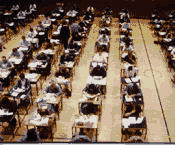
“ Invigilating examinations is not a productive use of teachers’ time. From September 2005, teachers will no longer routinely be required to invigilate external examinations (eg National Curriculum tests, GCSE and AS/A2 examinations.”
These are not the words of the NUT, although of course we agree with them. They are taken from the School Teachers Pay and Conditions Document.
But what about internal exams?
The STPCD goes on:
“Teachers may be required to supervise internal examinations and tests where these take place during their normal timetabled teaching time. However, if a school reorganises the timetable for “mock” examinations to replicate the public examination process then teachers should not be required to invigilate.”
And what about “gained time”
when, for example, Year 11 are on study leave?
Again, teachers should not be asked to invigilate. Certain tasks can be required (listed in the STPCD) but invigilation is not one of them.
The only occasions when a teacher may need to be present, says the STPCD, are specialist exams (eg . language orals), the end of exams to check papers, or in emergencies.
As a system of invigilating exams without the use of teachers should have been the norm since September 2005, it is unjustifiable for schools to complain that they are unable to deliver it.
INVIGILATION
